Leadership Development Course Reflection: Personal Journey
VerifiedAdded on 2021/04/21
|7
|2026
|27
Journal and Reflective Writing
AI Summary
This reflective writing piece details a student's journey through a leadership development course, utilizing the Gibbs reflective cycle to analyze their experiences. The student reflects on group activities, workshops, and personal growth. Key areas of focus include teamwork, communication, and self-assessment through exercises like 'coach, coaching and observer' and personality assessments. The student discusses conflicts within the group, the experience of conducting workshops, and the application of leadership theories like LMX and situational leadership. They also analyze their strengths, such as empathy and people management, as well as areas for improvement, like communication skills. Finally, the student outlines a future action plan to enhance their leadership abilities, emphasizing the importance of communication, building leadership traits, and creating a positive work environment. The assignment highlights the impact of the course on the student's understanding of leadership and their aspirations for future leadership roles.
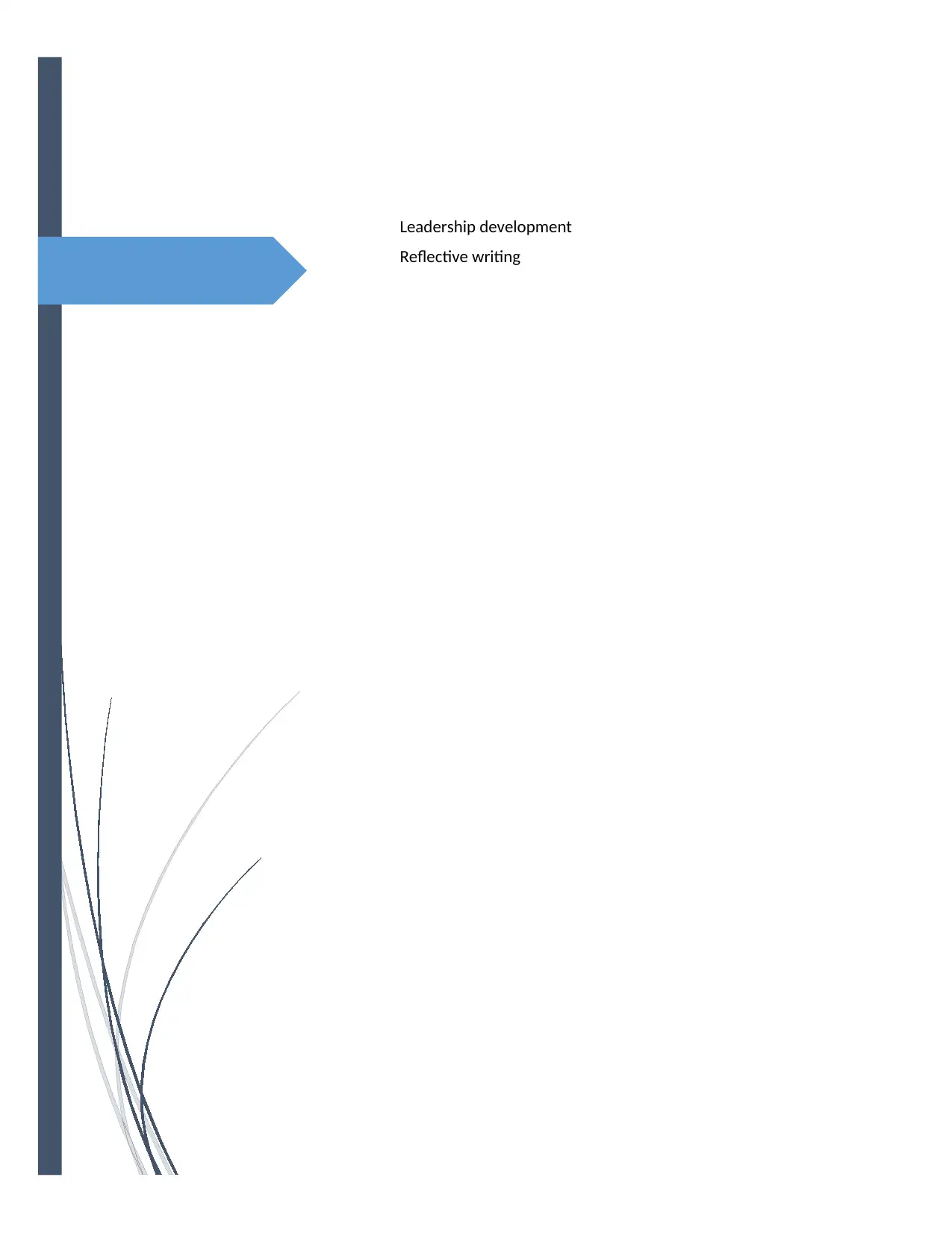
Leadership development
Reflective writing
Reflective writing
Paraphrase This Document
Need a fresh take? Get an instant paraphrase of this document with our AI Paraphraser
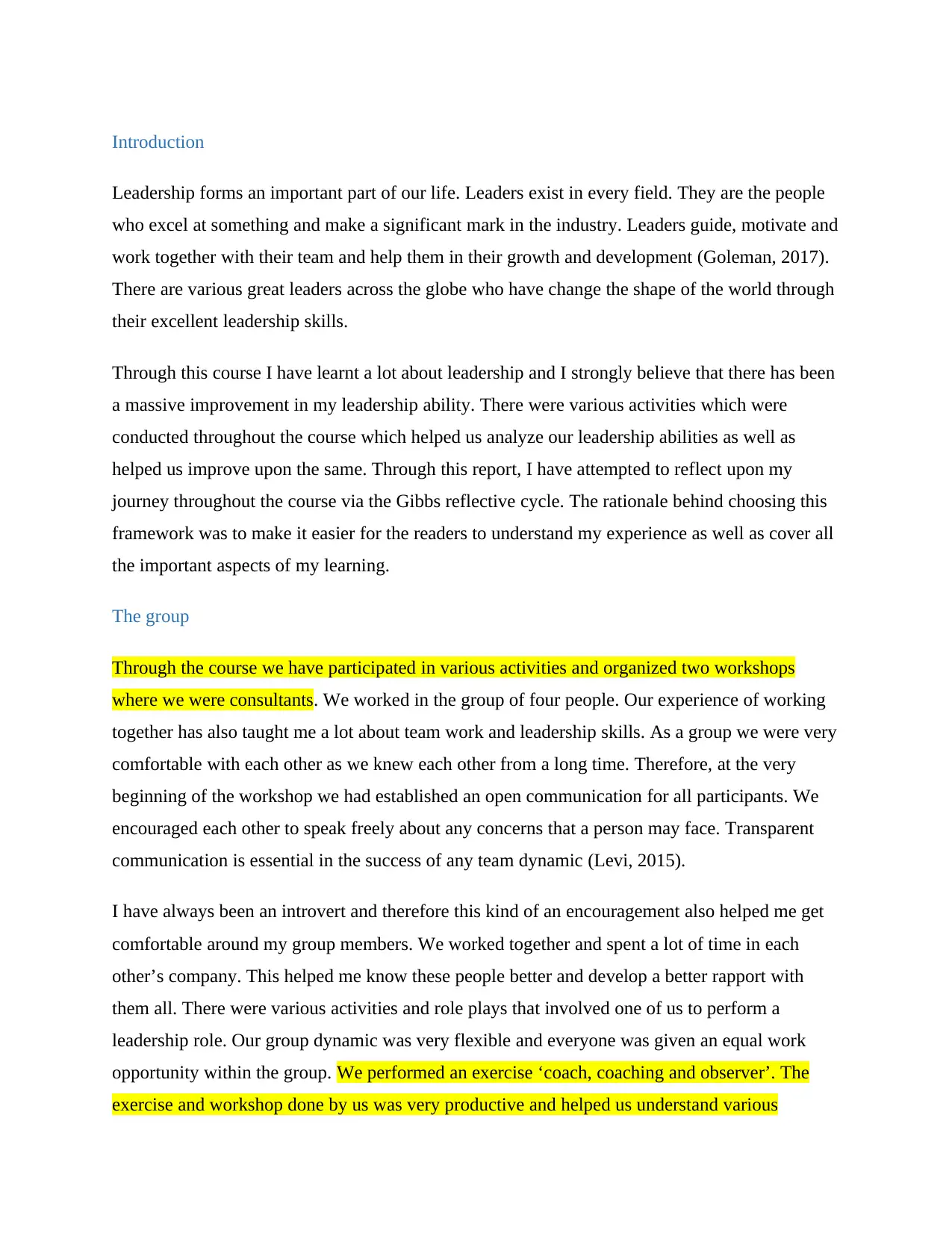
Introduction
Leadership forms an important part of our life. Leaders exist in every field. They are the people
who excel at something and make a significant mark in the industry. Leaders guide, motivate and
work together with their team and help them in their growth and development (Goleman, 2017).
There are various great leaders across the globe who have change the shape of the world through
their excellent leadership skills.
Through this course I have learnt a lot about leadership and I strongly believe that there has been
a massive improvement in my leadership ability. There were various activities which were
conducted throughout the course which helped us analyze our leadership abilities as well as
helped us improve upon the same. Through this report, I have attempted to reflect upon my
journey throughout the course via the Gibbs reflective cycle. The rationale behind choosing this
framework was to make it easier for the readers to understand my experience as well as cover all
the important aspects of my learning.
The group
Through the course we have participated in various activities and organized two workshops
where we were consultants. We worked in the group of four people. Our experience of working
together has also taught me a lot about team work and leadership skills. As a group we were very
comfortable with each other as we knew each other from a long time. Therefore, at the very
beginning of the workshop we had established an open communication for all participants. We
encouraged each other to speak freely about any concerns that a person may face. Transparent
communication is essential in the success of any team dynamic (Levi, 2015).
I have always been an introvert and therefore this kind of an encouragement also helped me get
comfortable around my group members. We worked together and spent a lot of time in each
other’s company. This helped me know these people better and develop a better rapport with
them all. There were various activities and role plays that involved one of us to perform a
leadership role. Our group dynamic was very flexible and everyone was given an equal work
opportunity within the group. We performed an exercise ‘coach, coaching and observer’. The
exercise and workshop done by us was very productive and helped us understand various
Leadership forms an important part of our life. Leaders exist in every field. They are the people
who excel at something and make a significant mark in the industry. Leaders guide, motivate and
work together with their team and help them in their growth and development (Goleman, 2017).
There are various great leaders across the globe who have change the shape of the world through
their excellent leadership skills.
Through this course I have learnt a lot about leadership and I strongly believe that there has been
a massive improvement in my leadership ability. There were various activities which were
conducted throughout the course which helped us analyze our leadership abilities as well as
helped us improve upon the same. Through this report, I have attempted to reflect upon my
journey throughout the course via the Gibbs reflective cycle. The rationale behind choosing this
framework was to make it easier for the readers to understand my experience as well as cover all
the important aspects of my learning.
The group
Through the course we have participated in various activities and organized two workshops
where we were consultants. We worked in the group of four people. Our experience of working
together has also taught me a lot about team work and leadership skills. As a group we were very
comfortable with each other as we knew each other from a long time. Therefore, at the very
beginning of the workshop we had established an open communication for all participants. We
encouraged each other to speak freely about any concerns that a person may face. Transparent
communication is essential in the success of any team dynamic (Levi, 2015).
I have always been an introvert and therefore this kind of an encouragement also helped me get
comfortable around my group members. We worked together and spent a lot of time in each
other’s company. This helped me know these people better and develop a better rapport with
them all. There were various activities and role plays that involved one of us to perform a
leadership role. Our group dynamic was very flexible and everyone was given an equal work
opportunity within the group. We performed an exercise ‘coach, coaching and observer’. The
exercise and workshop done by us was very productive and helped us understand various
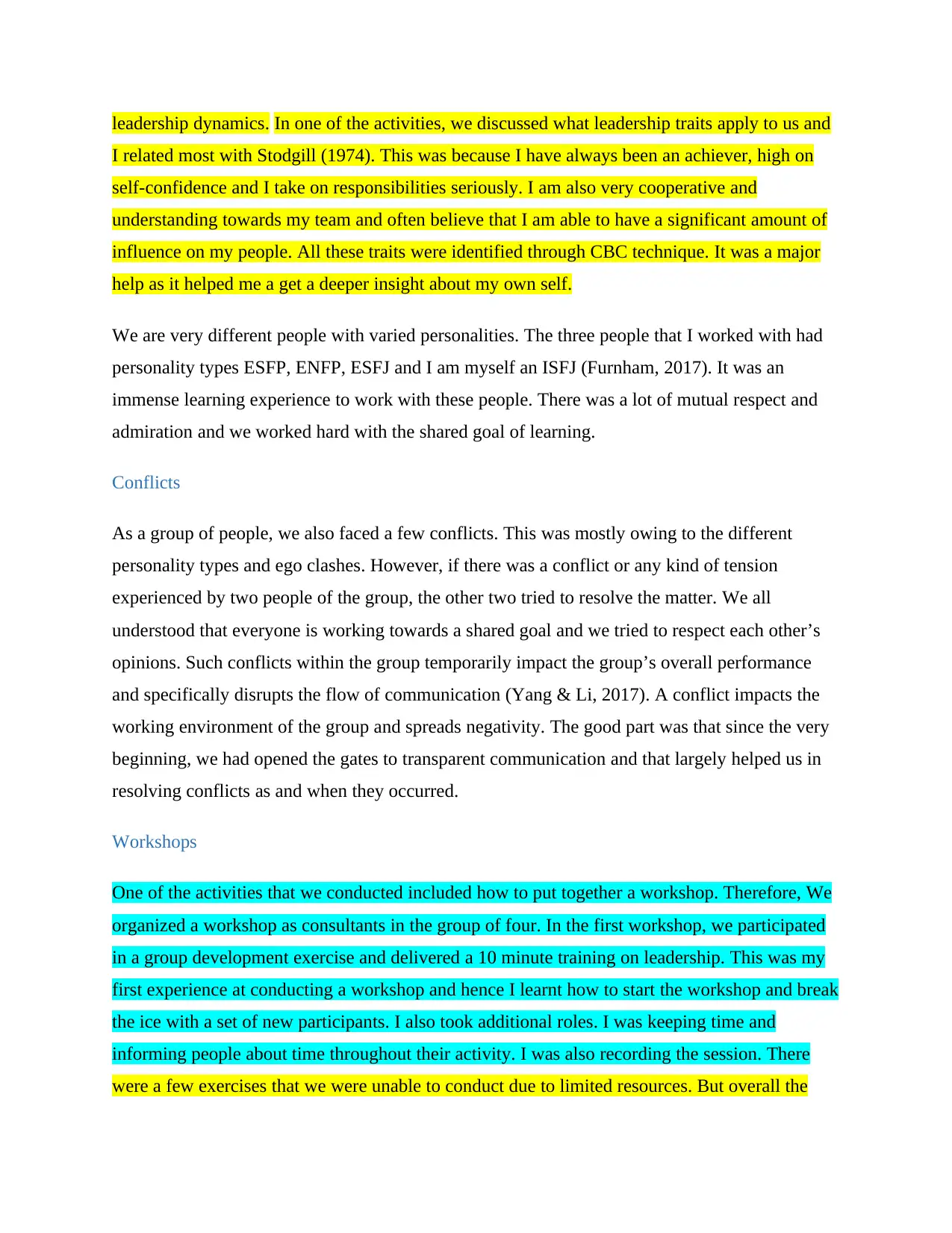
leadership dynamics. In one of the activities, we discussed what leadership traits apply to us and
I related most with Stodgill (1974). This was because I have always been an achiever, high on
self-confidence and I take on responsibilities seriously. I am also very cooperative and
understanding towards my team and often believe that I am able to have a significant amount of
influence on my people. All these traits were identified through CBC technique. It was a major
help as it helped me a get a deeper insight about my own self.
We are very different people with varied personalities. The three people that I worked with had
personality types ESFP, ENFP, ESFJ and I am myself an ISFJ (Furnham, 2017). It was an
immense learning experience to work with these people. There was a lot of mutual respect and
admiration and we worked hard with the shared goal of learning.
Conflicts
As a group of people, we also faced a few conflicts. This was mostly owing to the different
personality types and ego clashes. However, if there was a conflict or any kind of tension
experienced by two people of the group, the other two tried to resolve the matter. We all
understood that everyone is working towards a shared goal and we tried to respect each other’s
opinions. Such conflicts within the group temporarily impact the group’s overall performance
and specifically disrupts the flow of communication (Yang & Li, 2017). A conflict impacts the
working environment of the group and spreads negativity. The good part was that since the very
beginning, we had opened the gates to transparent communication and that largely helped us in
resolving conflicts as and when they occurred.
Workshops
One of the activities that we conducted included how to put together a workshop. Therefore, We
organized a workshop as consultants in the group of four. In the first workshop, we participated
in a group development exercise and delivered a 10 minute training on leadership. This was my
first experience at conducting a workshop and hence I learnt how to start the workshop and break
the ice with a set of new participants. I also took additional roles. I was keeping time and
informing people about time throughout their activity. I was also recording the session. There
were a few exercises that we were unable to conduct due to limited resources. But overall the
I related most with Stodgill (1974). This was because I have always been an achiever, high on
self-confidence and I take on responsibilities seriously. I am also very cooperative and
understanding towards my team and often believe that I am able to have a significant amount of
influence on my people. All these traits were identified through CBC technique. It was a major
help as it helped me a get a deeper insight about my own self.
We are very different people with varied personalities. The three people that I worked with had
personality types ESFP, ENFP, ESFJ and I am myself an ISFJ (Furnham, 2017). It was an
immense learning experience to work with these people. There was a lot of mutual respect and
admiration and we worked hard with the shared goal of learning.
Conflicts
As a group of people, we also faced a few conflicts. This was mostly owing to the different
personality types and ego clashes. However, if there was a conflict or any kind of tension
experienced by two people of the group, the other two tried to resolve the matter. We all
understood that everyone is working towards a shared goal and we tried to respect each other’s
opinions. Such conflicts within the group temporarily impact the group’s overall performance
and specifically disrupts the flow of communication (Yang & Li, 2017). A conflict impacts the
working environment of the group and spreads negativity. The good part was that since the very
beginning, we had opened the gates to transparent communication and that largely helped us in
resolving conflicts as and when they occurred.
Workshops
One of the activities that we conducted included how to put together a workshop. Therefore, We
organized a workshop as consultants in the group of four. In the first workshop, we participated
in a group development exercise and delivered a 10 minute training on leadership. This was my
first experience at conducting a workshop and hence I learnt how to start the workshop and break
the ice with a set of new participants. I also took additional roles. I was keeping time and
informing people about time throughout their activity. I was also recording the session. There
were a few exercises that we were unable to conduct due to limited resources. But overall the
⊘ This is a preview!⊘
Do you want full access?
Subscribe today to unlock all pages.

Trusted by 1+ million students worldwide
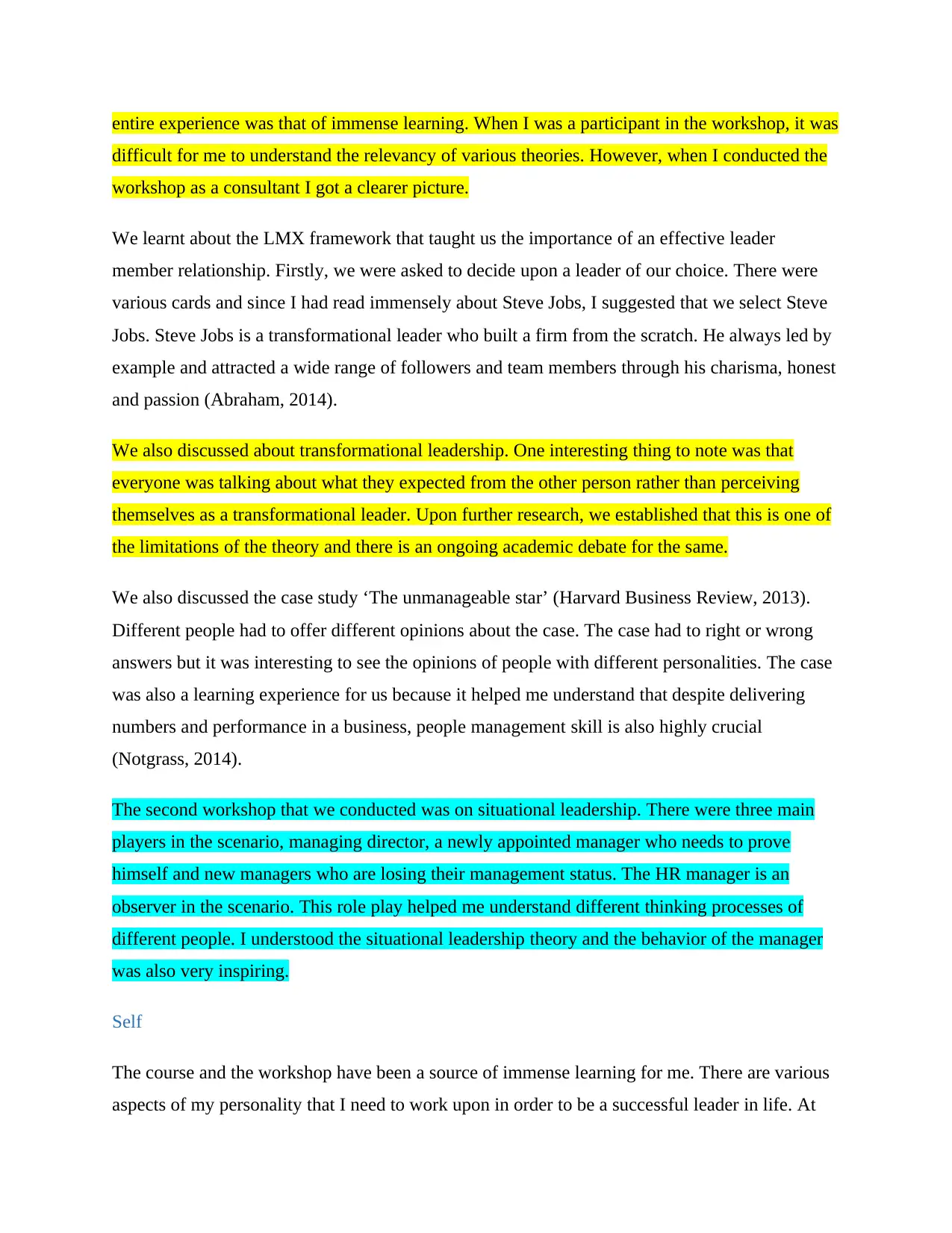
entire experience was that of immense learning. When I was a participant in the workshop, it was
difficult for me to understand the relevancy of various theories. However, when I conducted the
workshop as a consultant I got a clearer picture.
We learnt about the LMX framework that taught us the importance of an effective leader
member relationship. Firstly, we were asked to decide upon a leader of our choice. There were
various cards and since I had read immensely about Steve Jobs, I suggested that we select Steve
Jobs. Steve Jobs is a transformational leader who built a firm from the scratch. He always led by
example and attracted a wide range of followers and team members through his charisma, honest
and passion (Abraham, 2014).
We also discussed about transformational leadership. One interesting thing to note was that
everyone was talking about what they expected from the other person rather than perceiving
themselves as a transformational leader. Upon further research, we established that this is one of
the limitations of the theory and there is an ongoing academic debate for the same.
We also discussed the case study ‘The unmanageable star’ (Harvard Business Review, 2013).
Different people had to offer different opinions about the case. The case had to right or wrong
answers but it was interesting to see the opinions of people with different personalities. The case
was also a learning experience for us because it helped me understand that despite delivering
numbers and performance in a business, people management skill is also highly crucial
(Notgrass, 2014).
The second workshop that we conducted was on situational leadership. There were three main
players in the scenario, managing director, a newly appointed manager who needs to prove
himself and new managers who are losing their management status. The HR manager is an
observer in the scenario. This role play helped me understand different thinking processes of
different people. I understood the situational leadership theory and the behavior of the manager
was also very inspiring.
Self
The course and the workshop have been a source of immense learning for me. There are various
aspects of my personality that I need to work upon in order to be a successful leader in life. At
difficult for me to understand the relevancy of various theories. However, when I conducted the
workshop as a consultant I got a clearer picture.
We learnt about the LMX framework that taught us the importance of an effective leader
member relationship. Firstly, we were asked to decide upon a leader of our choice. There were
various cards and since I had read immensely about Steve Jobs, I suggested that we select Steve
Jobs. Steve Jobs is a transformational leader who built a firm from the scratch. He always led by
example and attracted a wide range of followers and team members through his charisma, honest
and passion (Abraham, 2014).
We also discussed about transformational leadership. One interesting thing to note was that
everyone was talking about what they expected from the other person rather than perceiving
themselves as a transformational leader. Upon further research, we established that this is one of
the limitations of the theory and there is an ongoing academic debate for the same.
We also discussed the case study ‘The unmanageable star’ (Harvard Business Review, 2013).
Different people had to offer different opinions about the case. The case had to right or wrong
answers but it was interesting to see the opinions of people with different personalities. The case
was also a learning experience for us because it helped me understand that despite delivering
numbers and performance in a business, people management skill is also highly crucial
(Notgrass, 2014).
The second workshop that we conducted was on situational leadership. There were three main
players in the scenario, managing director, a newly appointed manager who needs to prove
himself and new managers who are losing their management status. The HR manager is an
observer in the scenario. This role play helped me understand different thinking processes of
different people. I understood the situational leadership theory and the behavior of the manager
was also very inspiring.
Self
The course and the workshop have been a source of immense learning for me. There are various
aspects of my personality that I need to work upon in order to be a successful leader in life. At
Paraphrase This Document
Need a fresh take? Get an instant paraphrase of this document with our AI Paraphraser
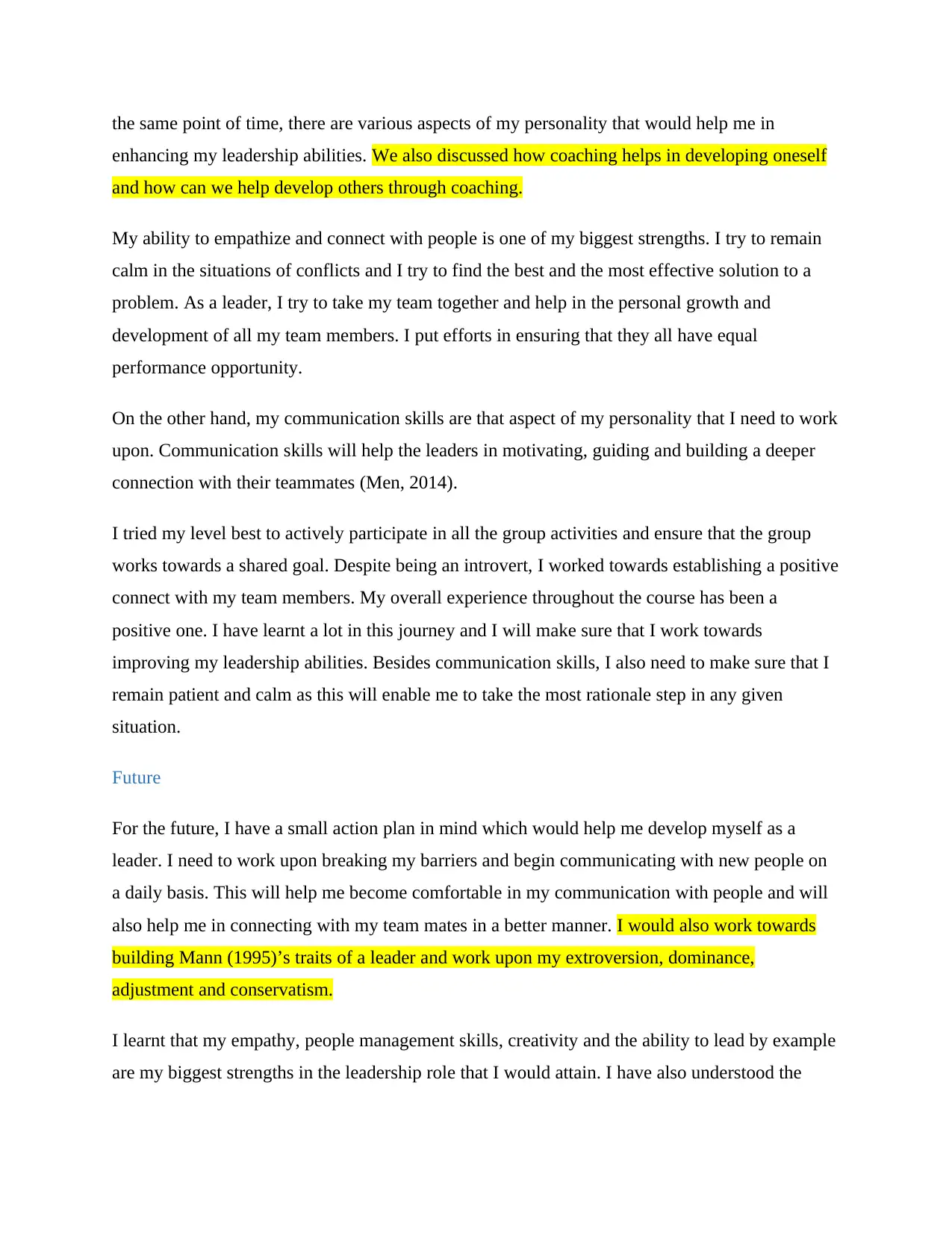
the same point of time, there are various aspects of my personality that would help me in
enhancing my leadership abilities. We also discussed how coaching helps in developing oneself
and how can we help develop others through coaching.
My ability to empathize and connect with people is one of my biggest strengths. I try to remain
calm in the situations of conflicts and I try to find the best and the most effective solution to a
problem. As a leader, I try to take my team together and help in the personal growth and
development of all my team members. I put efforts in ensuring that they all have equal
performance opportunity.
On the other hand, my communication skills are that aspect of my personality that I need to work
upon. Communication skills will help the leaders in motivating, guiding and building a deeper
connection with their teammates (Men, 2014).
I tried my level best to actively participate in all the group activities and ensure that the group
works towards a shared goal. Despite being an introvert, I worked towards establishing a positive
connect with my team members. My overall experience throughout the course has been a
positive one. I have learnt a lot in this journey and I will make sure that I work towards
improving my leadership abilities. Besides communication skills, I also need to make sure that I
remain patient and calm as this will enable me to take the most rationale step in any given
situation.
Future
For the future, I have a small action plan in mind which would help me develop myself as a
leader. I need to work upon breaking my barriers and begin communicating with new people on
a daily basis. This will help me become comfortable in my communication with people and will
also help me in connecting with my team mates in a better manner. I would also work towards
building Mann (1995)’s traits of a leader and work upon my extroversion, dominance,
adjustment and conservatism.
I learnt that my empathy, people management skills, creativity and the ability to lead by example
are my biggest strengths in the leadership role that I would attain. I have also understood the
enhancing my leadership abilities. We also discussed how coaching helps in developing oneself
and how can we help develop others through coaching.
My ability to empathize and connect with people is one of my biggest strengths. I try to remain
calm in the situations of conflicts and I try to find the best and the most effective solution to a
problem. As a leader, I try to take my team together and help in the personal growth and
development of all my team members. I put efforts in ensuring that they all have equal
performance opportunity.
On the other hand, my communication skills are that aspect of my personality that I need to work
upon. Communication skills will help the leaders in motivating, guiding and building a deeper
connection with their teammates (Men, 2014).
I tried my level best to actively participate in all the group activities and ensure that the group
works towards a shared goal. Despite being an introvert, I worked towards establishing a positive
connect with my team members. My overall experience throughout the course has been a
positive one. I have learnt a lot in this journey and I will make sure that I work towards
improving my leadership abilities. Besides communication skills, I also need to make sure that I
remain patient and calm as this will enable me to take the most rationale step in any given
situation.
Future
For the future, I have a small action plan in mind which would help me develop myself as a
leader. I need to work upon breaking my barriers and begin communicating with new people on
a daily basis. This will help me become comfortable in my communication with people and will
also help me in connecting with my team mates in a better manner. I would also work towards
building Mann (1995)’s traits of a leader and work upon my extroversion, dominance,
adjustment and conservatism.
I learnt that my empathy, people management skills, creativity and the ability to lead by example
are my biggest strengths in the leadership role that I would attain. I have also understood the
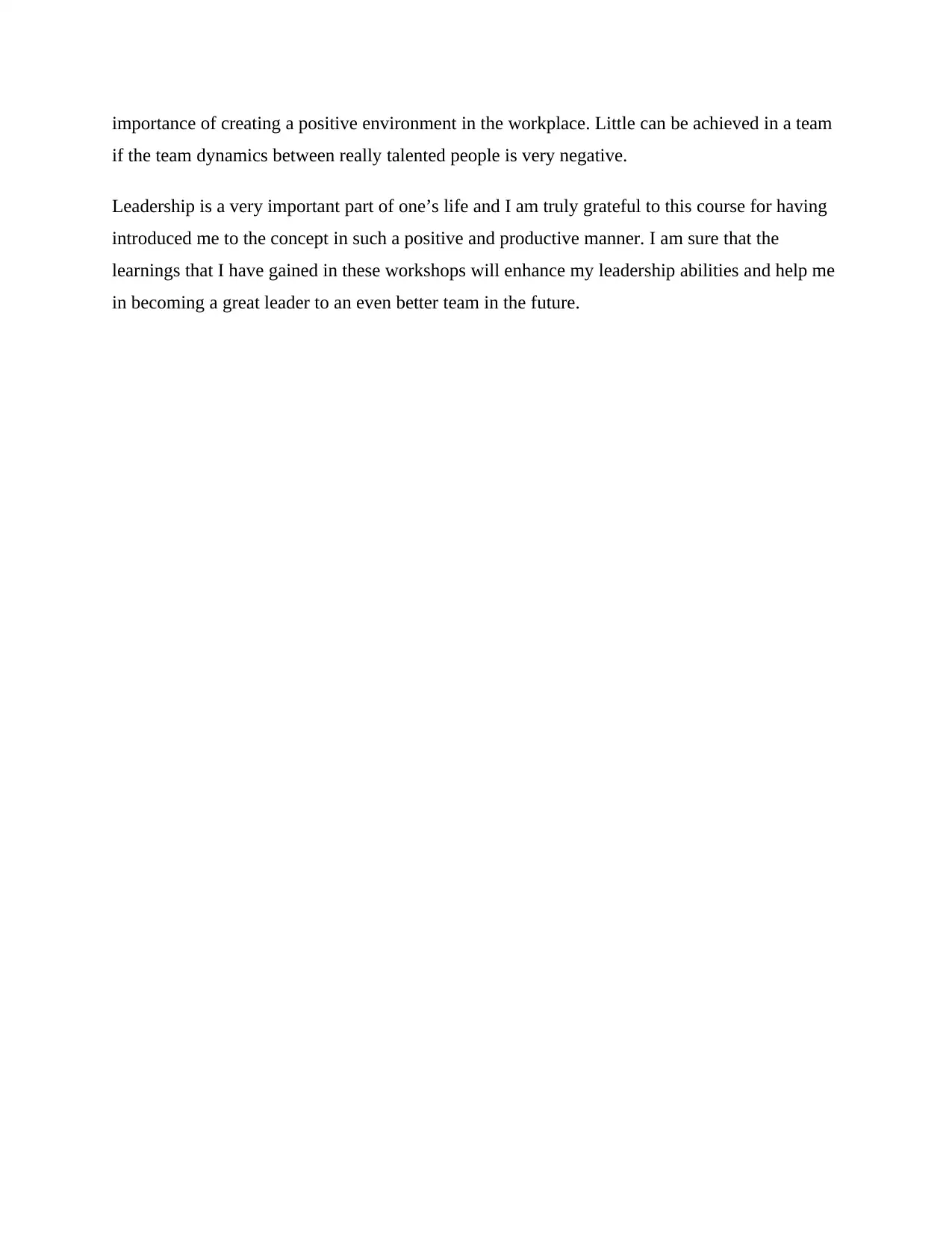
importance of creating a positive environment in the workplace. Little can be achieved in a team
if the team dynamics between really talented people is very negative.
Leadership is a very important part of one’s life and I am truly grateful to this course for having
introduced me to the concept in such a positive and productive manner. I am sure that the
learnings that I have gained in these workshops will enhance my leadership abilities and help me
in becoming a great leader to an even better team in the future.
if the team dynamics between really talented people is very negative.
Leadership is a very important part of one’s life and I am truly grateful to this course for having
introduced me to the concept in such a positive and productive manner. I am sure that the
learnings that I have gained in these workshops will enhance my leadership abilities and help me
in becoming a great leader to an even better team in the future.
⊘ This is a preview!⊘
Do you want full access?
Subscribe today to unlock all pages.

Trusted by 1+ million students worldwide
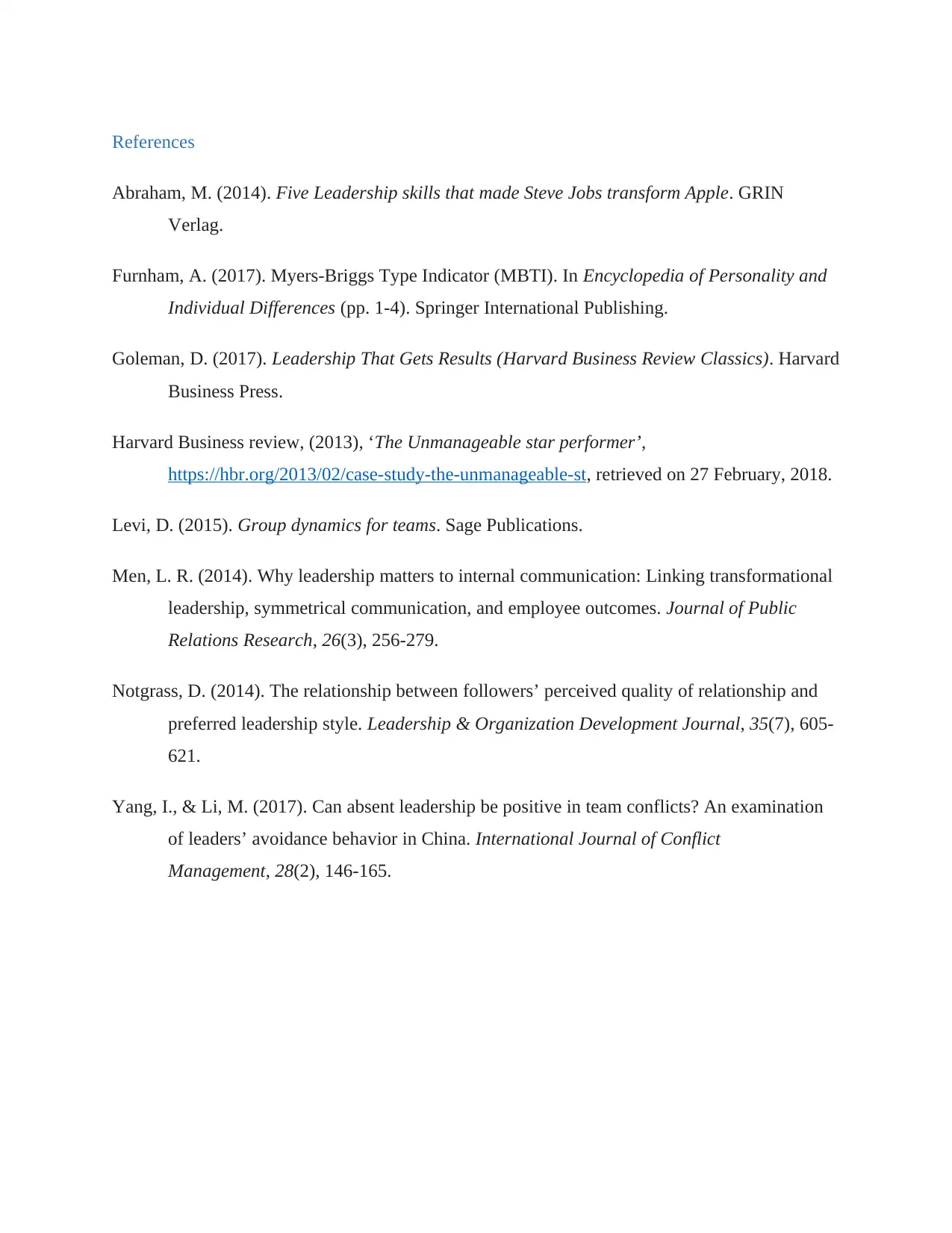
References
Abraham, M. (2014). Five Leadership skills that made Steve Jobs transform Apple. GRIN
Verlag.
Furnham, A. (2017). Myers-Briggs Type Indicator (MBTI). In Encyclopedia of Personality and
Individual Differences (pp. 1-4). Springer International Publishing.
Goleman, D. (2017). Leadership That Gets Results (Harvard Business Review Classics). Harvard
Business Press.
Harvard Business review, (2013), ‘The Unmanageable star performer’,
https://hbr.org/2013/02/case-study-the-unmanageable-st, retrieved on 27 February, 2018.
Levi, D. (2015). Group dynamics for teams. Sage Publications.
Men, L. R. (2014). Why leadership matters to internal communication: Linking transformational
leadership, symmetrical communication, and employee outcomes. Journal of Public
Relations Research, 26(3), 256-279.
Notgrass, D. (2014). The relationship between followers’ perceived quality of relationship and
preferred leadership style. Leadership & Organization Development Journal, 35(7), 605-
621.
Yang, I., & Li, M. (2017). Can absent leadership be positive in team conflicts? An examination
of leaders’ avoidance behavior in China. International Journal of Conflict
Management, 28(2), 146-165.
Abraham, M. (2014). Five Leadership skills that made Steve Jobs transform Apple. GRIN
Verlag.
Furnham, A. (2017). Myers-Briggs Type Indicator (MBTI). In Encyclopedia of Personality and
Individual Differences (pp. 1-4). Springer International Publishing.
Goleman, D. (2017). Leadership That Gets Results (Harvard Business Review Classics). Harvard
Business Press.
Harvard Business review, (2013), ‘The Unmanageable star performer’,
https://hbr.org/2013/02/case-study-the-unmanageable-st, retrieved on 27 February, 2018.
Levi, D. (2015). Group dynamics for teams. Sage Publications.
Men, L. R. (2014). Why leadership matters to internal communication: Linking transformational
leadership, symmetrical communication, and employee outcomes. Journal of Public
Relations Research, 26(3), 256-279.
Notgrass, D. (2014). The relationship between followers’ perceived quality of relationship and
preferred leadership style. Leadership & Organization Development Journal, 35(7), 605-
621.
Yang, I., & Li, M. (2017). Can absent leadership be positive in team conflicts? An examination
of leaders’ avoidance behavior in China. International Journal of Conflict
Management, 28(2), 146-165.
1 out of 7
Related Documents
Your All-in-One AI-Powered Toolkit for Academic Success.
+13062052269
info@desklib.com
Available 24*7 on WhatsApp / Email
![[object Object]](/_next/static/media/star-bottom.7253800d.svg)
Unlock your academic potential
Copyright © 2020–2026 A2Z Services. All Rights Reserved. Developed and managed by ZUCOL.





